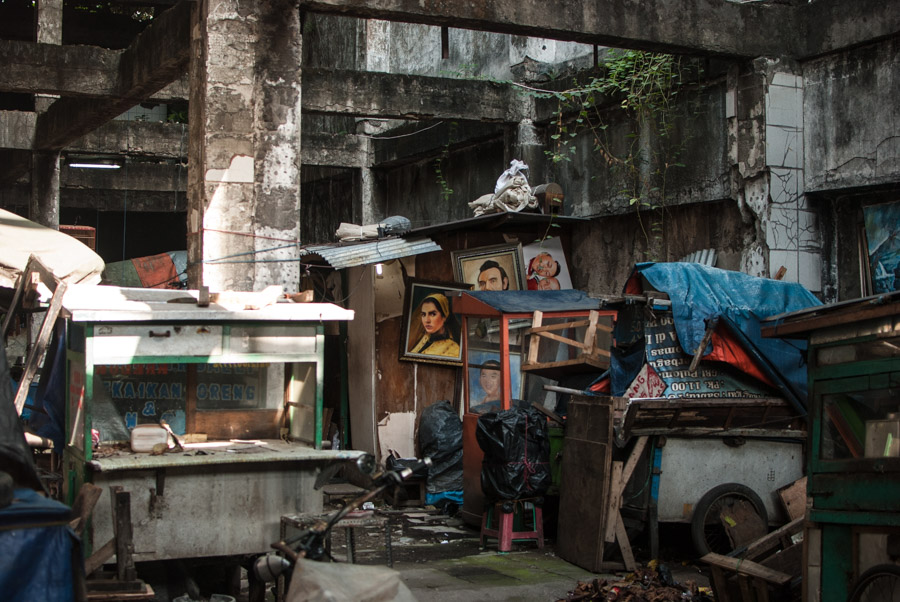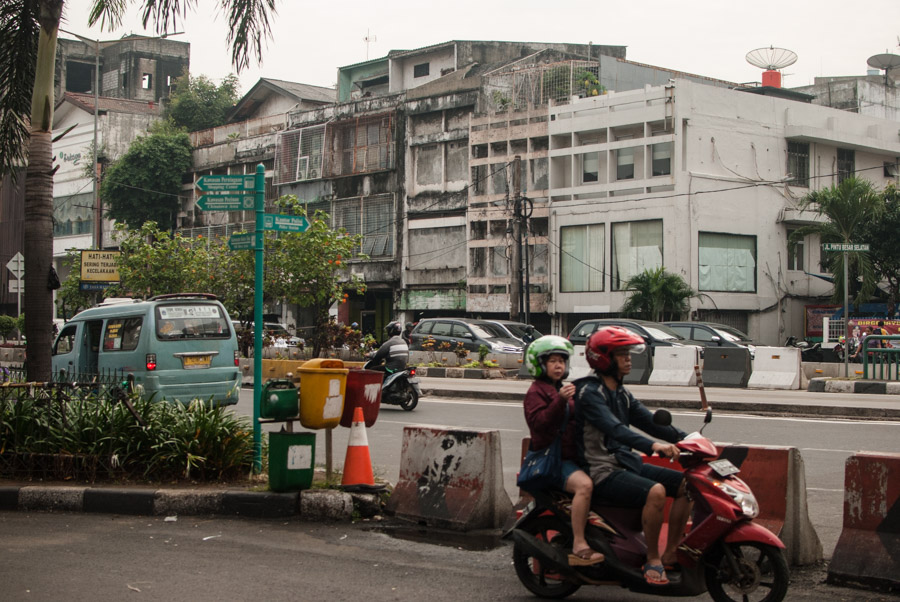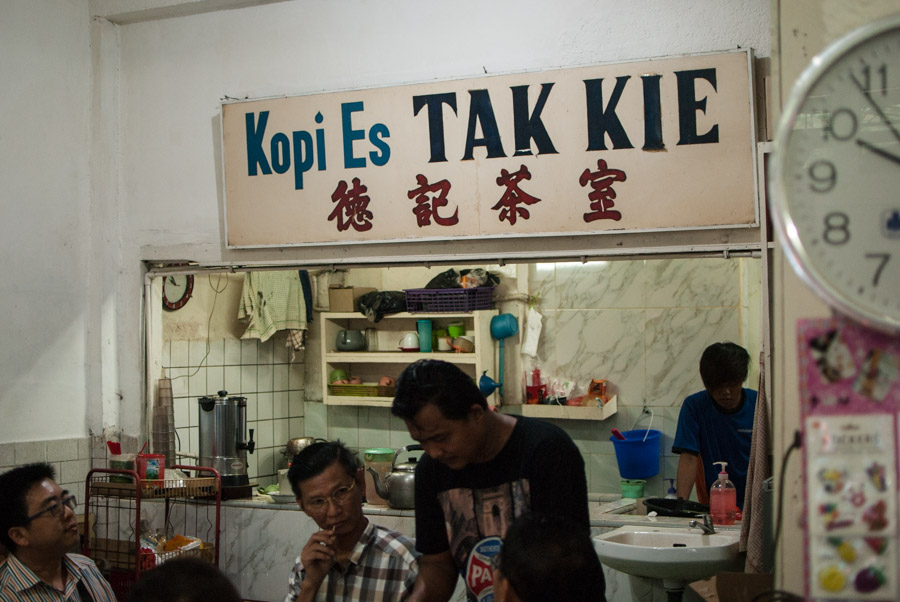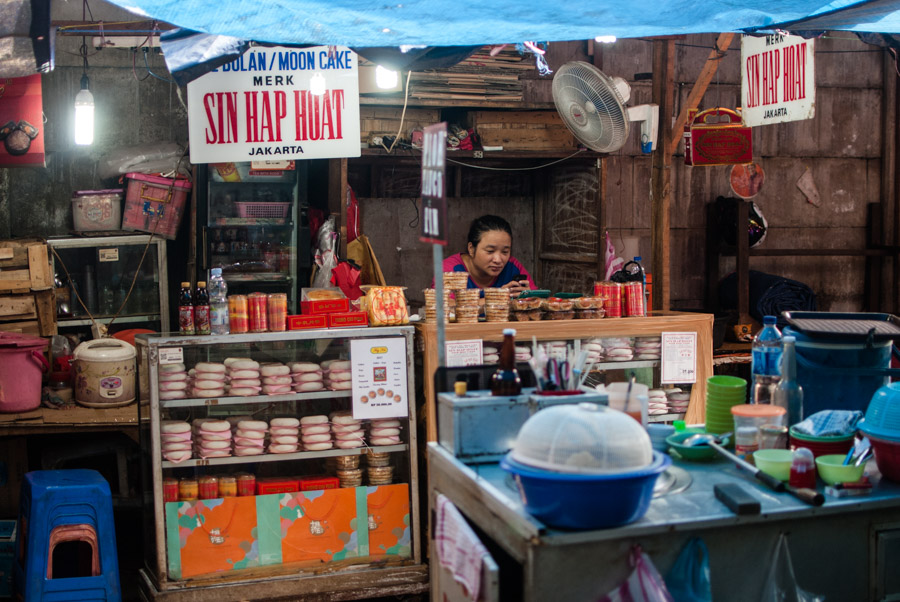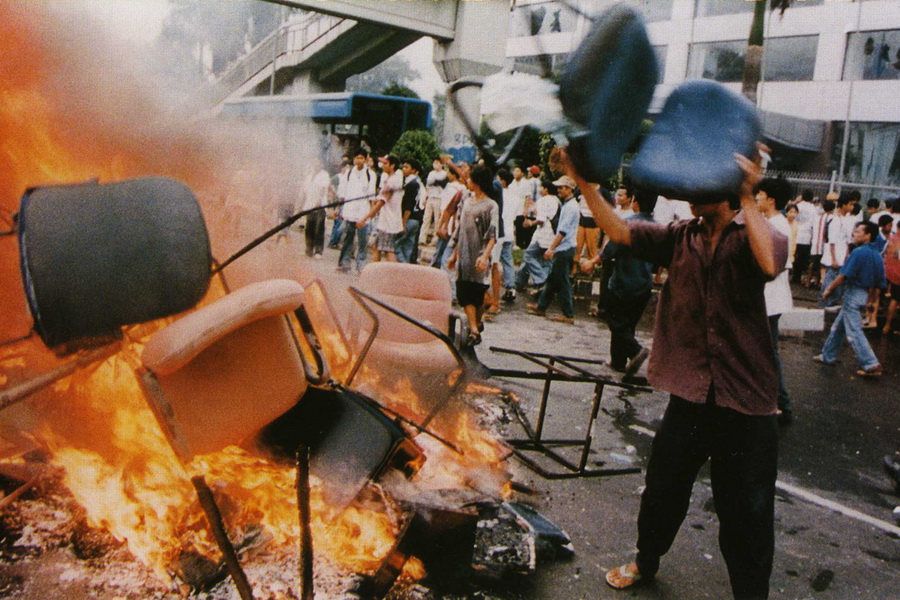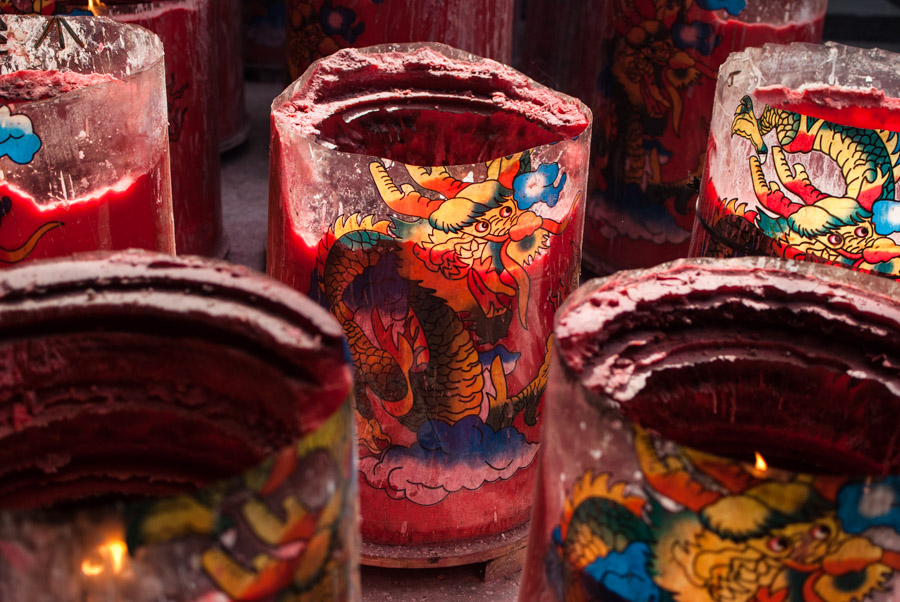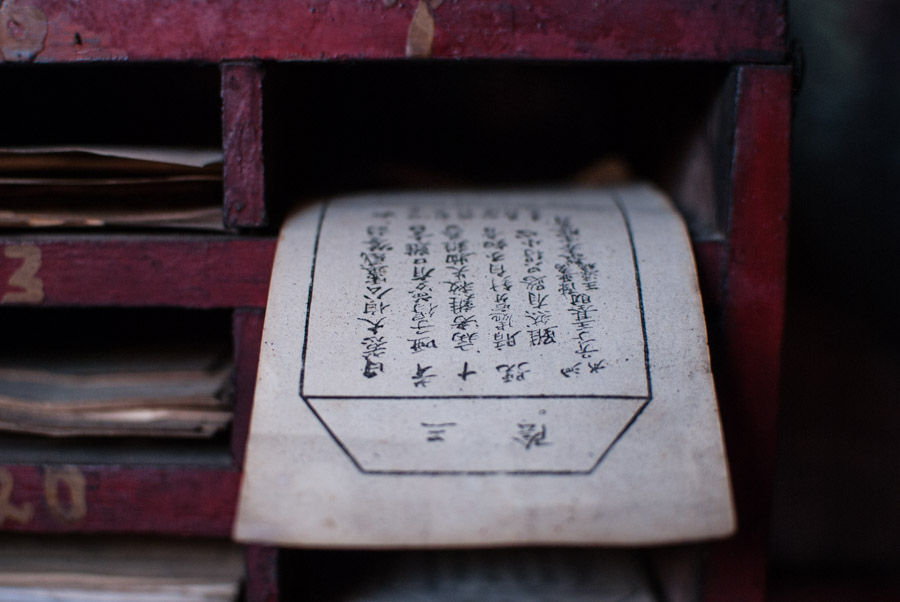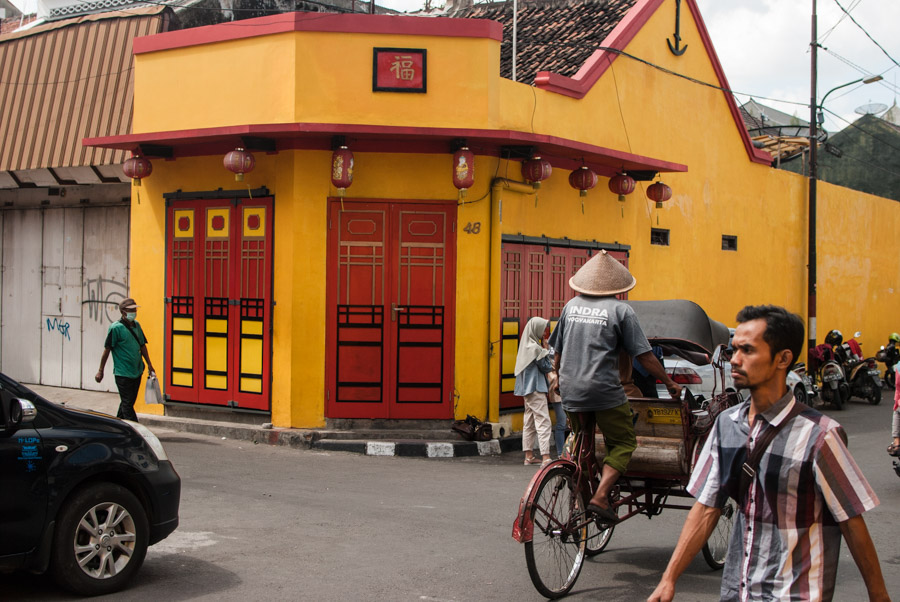After the jailing of Jakarta’s former governor, Chinese Indonesians find themselves caught between age-old prejudice and fears of a rising China.
JAKARTA — Nearly two decades after anti-Chinese riots tore through this part of Indonesia’s capital, one busy road still bears the scars.Amid the clamor of heat and traffic of Glodok, Jakarta’s Chinatown, a row of shop-houses lies abandoned, an octagonal feng shui tile still attached to a bricked-up window. Across the street, through locked steel shutters, one can still make out the charred beams and blackened walls of rooms gutted by fire in 1998.
A nearby three-story building stands in ruins: a former furniture store destroyed during the rioting. “It’s been empty since 1998,” said Iskandar, 60, a street-side portrait painter who stores uses the space to store his wares. While the building has a Chinese owner, he said that they appear to have abandoned it. “Maybe it’s because they have bad memories,” he said. “Some of them have very bitter memories here.”
But anti-Chinese feeling in Indonesia is more than just a matter of memory. A rising tide of Islamic conservatism is now opening up the country’s ethnic fault lines as well as its religious ones. That leaves Indonesians of Chinese descent, who make up around 1.2 percent of the population and are traditionally one of the country’s most prosperous groups, dangerously vulnerable — and might magnify local tensions into international clashes.
In May 1998, when Indonesia’s dictator Suharto fell from power after 31 years, much of the popular anger was directed at Jakarta’s small but wealthy ethnic Chinese community. More than 1,000 people were killed in the riots, many of them Chinese; dozens of Chinese women and girls were raped. The Chinese were targeted on the assumption that they had grown fat from Suharto’s rule, even though many of the victims were small-scale traders.
Latif Yulus, 67, the owner of Kopi Es Tak Kie, the oldest café in Glodok, which his grandfather opened in 1927 after migrating from Guangdong, recalled a city on fire. “People were yelling, ‘burn, burn, destroy!’” he said. “It was chaos. There were fires everywhere. They took everything that they could from the Chinese.”
For many of Indonesia’s ethnic Chinese, echoes of May 1998 could be heard in the recent maelstrom surrounding Basuki Tjahaja Purnama, the jailed former governor of Jakarta who convicted of blasphemy in May and ousted from office..
The 51-year-old, better known by his nickname “Ahok,” was both ethnic Chinese and Christian — the first “double minority” to govern Indonesia’s capital for half a century. A brash, polarizing figure, his reelection campaign became the center of a sectarian storm after he referenced a passage of the Quran during a speech last September. (Around 42 percent of Indonesia’s Chinese are Christian; very few belong to the majority Muslim faith.)
After an edited version of the speech went viral, hard-line Islamist vigilante groups, including the Islamic Defenders Front, or FPI, mobilized; in late 2016 hundreds of thousands of protesters poured into the streets, calling for Ahok to be charged under Indonesia’s controversial blasphemy law. After losing an April 19 runoff election to his opponent Anies Baswedan, a court found him guilty of blasphemy and sentenced him to two years in prison.
Underpinning the anti-Ahok backlash was the creeping rise of Islamic conservatism in Indonesia, the world’s largest Muslim-majority nation. This has been fueled by decades of funding from Saudi Arabia, which has poured billions into the construction of mosques and pesantren (Islamic boarding schools) that promote its austere brand of Wahhabi Islam.
During the Jakarta election, Ahok’s political opponents used the public’s growing piety as a weapon against the governor and his ally, President Joko Widodo. Like other Chinese in Indonesia, Latif Yulus, the café owner, now fears that the politicians and Islamist radicals who railroaded Ahok will cause further difficulties for his community in the run-up to the presidential election scheduled for 2019. “In the end, they will target the Chinese,” he said.
Ahok was in many ways the ideal target for sectarian troublemakers. Ethnic Chinese have been a part of Indonesian society for centuries, but have long been perceived as occupying a privileged perch in the country’s economic hierarchy. Michael Vatikiotis, the author of the new book Blood and Silk: Power and Conflict in Modern Southeast Asia, likened the Chinese of Indonesia to the Jews of Europe. “They are seen as a people apart,” he said, “and in their pursuit of commerce often become the victims of periodic bloodletting — pogroms, if you like.”
It is a pattern that dates to the beginning of Dutch rule in the 17th century, when Chinese merchants were granted a preferential role and helped develop Batavia (today’s Jakarta) into a flourishing entrepôt, prompting occasional eruptions of violence from other locals. These prejudices persisted after independence, and Chinese were singled out during the 1965-1966 anti-communist bloodshed that preceded Suharto’s takeover. At the time, they were seen as fifth-columnists for Communist China, then in the midst of exporting revolution throughout Southeast Asia. Since then, anti-Chinese rhetoric has tended to go hand in hand with paranoid imaginings of a renascent communism.
Suharto’s “New Order” government subsequently shuttered Chinese schools and newspapers, and banned the use of Chinese dialects. At the same time Suharto cultivated Chinese tycoons, who became economic pillars of his rule. When the Asian financial crisis hit Indonesia in 1997, setting off protests that culminated in Suharto’s overthrow the following year, popular anger was directed at the familiar scapegoat.
Charlotte Setijadi, a fellow at the ISEAS-Yusof Ishak Institute in Singapore, said that Ahok came to embody many traditional stereotypes about ethnic Chinese — a perception only amplified by Jakarta’s widening gap between rich and poor. “He was kind of like the perfect embodiment of all of that: a Chinese Christian, an impolite man in a position of power, who insulted the faith of the majority of Indonesians,” she said.
As a result, opinions about Ahok are divided among Jakarta’s Chinese. While many people express pride that one of their own could rise so high, others accuse him of disturbing the city’s delicate ethnic balance. “It’s better to stay quiet,” said Ie Tiat Fo, 57, a Hokkien textile merchant in Glodok. “When he chose to be quiet, everything was okay.”
But this defensive crouch may be harder to sustain in an era in which China has become a formidable economic and political power in Southeast Asia. China is now Indonesia’s top trading partner, and recently overtook the United States to become the country’s third-largest source of foreign investment. These ties are straining relations on the ground, where Chinese are resented as newcomers and interlopers.
President Joko Widodo has generally welcomed Chinese investments, including a $5 billion high-speed rail line connecting the capital to the West Java city of Bandung. But Chinese firms’ importation of mainland workers to complete infrastructure projects has recently fanned the flames of anti-China sentiment.
During the Ahok affair, rumors circulated on Facebook claiming that the governor was reclaiming land in northern Jakarta to house 10 million mainland Chinese workers (according to official figures, 21,271 work permits have been granted to Chinese); another “fake news” item involved a purported Chinese plot to import dried chilies infested with bacteria. Many of these claims were repeated to me in a recent interview with Habib Muschin Alatas, a senior FPI leader, who denounced Ahok quite openly as an “agent of Chinese imperialism.”
Setijadi, the scholar in Singapore, said the emergence of China has put Chinese Indonesians in an awkward position. They are well-placed to act as an economic, cultural, and linguistic “bridge” between mainland China and Indonesia. But in doing so, they run the risk of reinforcing old prejudices about their divided loyalties. She has observed that positive perceptions of China rarely transfer to Indonesia’s ethnic Chinese, “while negative stuff almost certainly gets connected to Chinese Indonesians.”
One prominent Chinese-Indonesian businessman, who requested anonymity, said that Indonesia had a great deal to gain from China: “There’s real meat there. You have Chinese who have lots of capital … and we need that capital to invest in infrastructure.”
While anti-Chinese sentiment would probably never go away, the businessman said that the outcome of the Ahok election was actually a sign of the resilience of Indonesian tolerance. “A Christian Chinese governor, who was extremely divisive and rude, still won 42 percent of the votes,” he said.
Still, the Indonesian situation hints at the ways in which China’s rise might affect the Chinese diasporas scattered across Southeast Asia. Next door in Malaysia, where ethnic Chinese make up around a fifth of the population, a $38 billion Chinese real estate megaproject in the state of Johor, bordering Singapore, has become the focus of fresh anti-Chinese politicking by Malay politicians.
Among them are nonagenarian former Prime Minister Mahathir Mohamad, who has turned on his former protégé, Prime Minister Najib Razak, accusing his government of selling off the country’s “most valuable land” to foreigners — an issue that now looms over elections due in 2018. Significant Chinese diasporas also exist in Myanmar and Vietnam — two nations that are apprehensive about China’s rapid rise, and also have histories of anti-Chinese attacks and discrimination.
Vatikiotis said that in Indonesia, fears of China have yet to really connect with local anti-Chinese prejudice, which remain overwhelmingly rooted in local economic inequalities, perceived or otherwise. A more pressing question was what Beijing might do in response to another round of bloodletting.
The 1998 riots prompted a nationalist backlash on the Chinese mainland, where the incident is now remembered as “Black May.” In August 1998, demonstrators in Beijing defied a government ban to protest both the Indonesian violence and what many saw as the lukewarm response from their own government, which initially forbade domestic reporting on the riots.
Christine Susanna Tjhin of the Center for Strategic and International Studies in Jakarta, who has done extensive research in China, said that the incident still resonates there. From taxidrivers to students to members of the business community, she said, “the image of May ’98 is firmly ingrained in the minds of mainland Chinese.”
Though the Chinese reaction was muted in 1998, a far more powerful Beijing is unlikely to take such a hands-off position today. In 2006, when anti-Chinese violence tore through Honiara, the capital of the Solomon Islands, Beijing responded immediately by evacuating 312 ethnic Chinese residents by air. The episode received extensive coverage in Chinese state media, which declared that “the government attaches great importance to the security and rights of the overseas Chinese.” Though it is hard to say just what Beijing’s reaction would be in Indonesia, Vatikiotis said that “there is every indication” that Beijing is watching closely, and would be “willing to do something to help its fellow Chinese.”
Despite their uncertain place between rising domestic tensions and a rising China, most Chinese Indonesians say their loyalties are clear. In Glodok, I talked with the owner of a small restaurant selling soto betawi, a local beef soup. Giving his name only as Afung, the 73-year-old spoke about his parents’ migration to Indonesia from Guangdong in 1940.
Afung said he was proud of his heritage — “everywhere we can see the sunrise, the Chinese are there,” he said — but it was hard to feel allegiance to a country that he has never seen with his own eyes. “I was born in Indonesia,” he said, “and I will die in Indonesia.”
Published by Foreign Policy, August 11, 2017
Reporting for this story was supported by a grant from the International Reporting Project.


